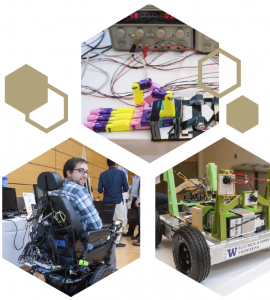Control Systems Pathway
 Control systems use math to model and manipulate the physical and non-physical worlds. In everyday life, our interactions with semi-autonomous cars, robotic drones, and smart devices in our homes are all examples of using technologies enabled by control systems. More broadly, control system techniques are employed in economic and financial systems, supply chain management, and other societal-scale decision-making problems.
Control systems use math to model and manipulate the physical and non-physical worlds. In everyday life, our interactions with semi-autonomous cars, robotic drones, and smart devices in our homes are all examples of using technologies enabled by control systems. More broadly, control system techniques are employed in economic and financial systems, supply chain management, and other societal-scale decision-making problems.
This pathway is a good fit for students who are interested in:
- Robotics
- Math (especially calculus, linear algebra, algorithms, and differential equations)
- Programming
- Signal processing
FAQs
Do I need a graduate degree specializing in this area to be marketable to industry?
No. Control systems engineers at big companies that design safety-critical systems (for example, aerospace and automotive) tend to have master’s and doctoral degrees. Control systems for less safety-critical systems, such as some robots and consumer products, may employ more basic control algorithms and focus more on programming and implementation. For those designing and developing less safety-critical control systems, a bachelor’s degree may suffice. Students with a focus in control systems often go on to do graduate work in systems theory, optimization, game theory, machine learning, neural engineering, power systems and data science.
Areas of Impact
Air and Space
Control systems are used throughout air and space systems, for example, autopilots, rocket attitude stabilization, and delivery drones.
Computing Data and Digital Technologies
Modern control systems are data-driven and implemented digitally with microprocessors and often networked computation.
Environmental Sustainability and Energy
Power systems that incorporate renewable energy use feedback control in a variety of ways — to control relative phase of two different power plants, to control the direction a wind turbine is pointing, and to decide which energy sources to ‘spin up’ and when.
Health and Medicine
Control systems are used in assistive devices such as prosthetics, exoskeletons, powered wheelchairs, brain-machine interfaces, as well as interventions such as deep-brain stimulation and pharmacology.
Infrastructure, Transportation, and Society
Control systems are often used in vehicle routing, traffic control, decision-making in ride-sharing apps and economic policy decision-making.
Robotics and Manufacturing
Control systems are often used in factory assembly (pick-and-place, packaging) and delivery (drones, cars and other semi-autonomous vehicles).
Related Career Paths
Students in this area have job opportunities in aerospace, robotics, manufacturing, medical devices, VR / AR, and embedded systems, at companies such as Boeing, SpaceX, Microsoft, Meta Reality Lab, Apple and Amazon.
On-the-job tasks for graduates with a focus in Control Systems include:
- Designing and implementing control algorithms for robotic arms used in manufacturing processes or developing adaptive cruise control systems that adjust vehicle speed based on traffic conditions.
- Developing and testing control systems for drones, ensuring stable flight and accurate navigation or collaborating in the design of autopilot systems for commercial aircraft, enhancing safety and efficiency.
- Designing and testing control algorithms for automated lighting and home security systems.
Control Systems Courses
When planning for courses, review projected course offerings here and be sure to check all course prerequisites (course titles below link to the catalog course description, which includes prerequisite information).
These courses are suggested for those following the Control Systems pathway but are not required to complete the BSECE degree program:
EE 347 — Introduction to Robotics and Control Systems
Introduces fundamentals of robotics and control systems, focusing on the modeling, design, and control of robotic systems. Topics include forward and inverse kinematics, control theory, robot sensing, navigation, and path planning. Incorporates simulations, and hands-on labs for program and control of robotics.
EE 447 — Feedback Control Systems
Students will learn how to synthesize and analyze algorithms that control physical systems such as vehicle autopilots, mobile robots, electrical generators and motors.
EE 445 — Foundations of Machine Learning and Optimization
In this course, students will learn how to understand the mathematics of optimization models and machine learning, and they will rigorously formulate and solve automated decision-making problems such as those found in machine learning systems, data-driven modeling and engineering design.
EE 510, 547, 548, 549 are available for students who are interested in graduate school.
Capstone
EE 497 (winter quarter) and EE 498 (spring quarter) — Engineering Entrepreneurial Capstone (ENGINE)
The Engineering Entrepreneurial Capstone program (ENGINE) is the culmination of a student’s electrical and computer engineering education at UW ECE. The program provides a unique opportunity for students to develop skills in collaborative systems engineering, project management, and most importantly, working in teams on real-world problems from industry-sponsored projects. The program is overseen by UW ECE faculty and students are guided by practicing engineers. The course culminates in a showcase of student projects, which is attended by industry sponsors and held at the end of spring quarter every year.
Crossing Paths
You may want to consider coursework in the following pathways:

